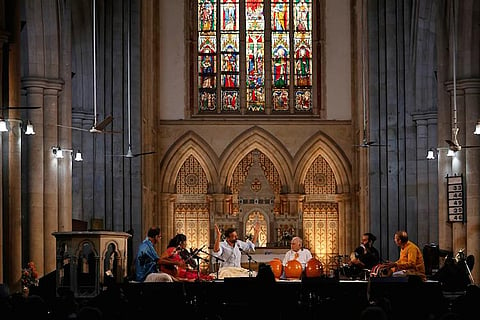

Last Sunday, the picturesque stained glass windows of the British-era Afghan Church in Colaba, Mumbai, echoed the music of Tamil sufi singer Nagoor Hanifa. Singing at a one of its kind performance in India, TM Krishna, in collaboration with the Mumbai-based First Edition Arts, brought together different religious and cultural identities at a time when these markers are increasingly defining public discourse in the country. This was at the culmination of a five-day festival called Karnatic Modern in Mumbai.
Over the years, TM Krishna has been a vocal opponent of the Brahmin-domination of Carnatic music and is known for speaking out against the exclusion of other castes in what is perceived as the "high" arts. For the past few years, he has been pushing for art and music to move into alternative spaces, and away from the traditional sabha culture. In yet another effort to push these boundaries, he has now taken Carnatic music to the Anglican Church, built by the British to honour their slain soldiers in the Afghan War. To add to this jugalbandi of different faiths, he performed a song popularised by Tamil sufi singer Nagoor Hanifa. And unsurprisingly, this is exactly what has landed Krishna in yet another controversy.
While those who attended the event by TM Krishna and ghatam maestro Vikku Vinayakram at the packed church have been heaping praises on the event, some have taken to Twitter and raked up a storm, even telling Krishna not to resort to “singing Jingle Bells in Ananda Bhairavi” ragam.
In the name of liberal values and taking Carnatic music everywhere , shit happens... unfortunate! Hope you are not singing jingle bells in Ananda Bhairavi...
— Adiyenramanujadasan (@anand290878) December 17, 2017
Carnatic music was sung unto Bhakthi and Vedantic traditions because it was a musical tradition for worship and emotion of Hinduism. A bunch of Leftists cannot walk in, claim the sale deed of Carnatic music. If u hv any shame, go build a music system on your own.
— Rag (@ragways) December 18, 2017
The hate comments, for a large part, claim the Carnatic music tradition as being exclusive to Hinduism and that “other communities must build their own.” Speaking to TNM, Christopher Elisha, the Secretary of the Pastorate Committee of the Afghan Church, said, "Music is spiritual. There is nothing controversial about this. We took it to be Indian classical music, not belonging to any particular religion."
The song, Allah-vai naan thozhudhaal, has been written by Nagoor Siddiqui and popularised in Islamic devotional music by Tamil sufi singer Nagoor Hanifa; TM Krishna has performed the song many times before as well.
Speaking on why he picked the song, Krishna says that it was the adaptability quotient. “If you listen to the lyrics, you will realise that the Divine could be Allah, Jesus or Krishna. Devotion in every religion is the same - and how we appeal, what we request, demand or ask of God and the endearment towards the Divine is the same whether you are a Jew or a Hindu. It connects all of us," he says.
Kalpana Nair, an attendee at the performance, said, “There was a deeper poignancy to the moment because it represented a true fusion of Hinduism and Christianity in a way. TM Krishna made sure Islam was part of the evening as well. I’m an atheist but it was close to a ‘religious’ experience.”
Devina Dutt of First Edition Arts is quick to point out that this was also the first time that koothu has come together on the same stage with Carnatic music. She says, “This has been an ongoing effort to make art and performance spaces accessible to both artistes as well as rasikas.” Even in a cultural melting pot like Mumbai, she says, “there are traditionally pockets of the city that have access to classical music and those that don’t. This is an effort to bridge those gaps.”
When asked if this collaboration was possible in Chennai, Krishna says, "I think Chennai will be harder to do. I’ll be happy to be wrong on that. May be it’s not so difficult, may be it’s just a question of asking people."
While Krishna remains unfazed by the tenor of the reaction to the event, he says, “I’ve never heard this kind of violent voice that accuses us of "Christianising of music". And I think this is utter nonsense. It will be wonderful if we get more churches, mosques and temples open themselves to music of all faiths.”